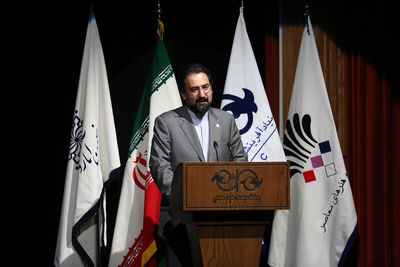Deputy Culture Minister Seyyed Mohammad Mojtaba Hosseini and a host of Iranian artists and officials, as well as prominent guests, scholars and researchers from across the globe attended the special event in Niavaran Cultural Complex that concentrated on Omar Khayyam’s life and work as a scientist, scholar and poet.
Addressing the event, Deputy Culture Minister Hosseini said the cultural and artistic world needs to pay greater attention to the unique achievements of Iranian luminaries in the fields of art and culture.
He went on to state that Iranian art is timeless and without geographical boundaries: All works of art by Omar Khayyam and other literary figures like Hafez, Mir Emad and Agha Mirak have one thing in common. They are all timeless works of art, as if they were created today.”
The deputy culture minister further said: Khayyam, like other great Iranian poets, has his own way of seeing the world. The Rubaiyat of this eleventh-century writer has been republished virtually every and translated into different languages. This includes his poems and those attributed to him.
He added: Khayyam saw art through a small mirror. At the same time, he showed us the whole world through his poems. For him, life was an instant, yet he worked hard throughout his life to complete and perfect the genre of the Rubai and the musical settings of his Rubaiyat.
Also speaking, secretary of the conference, Hassan Bolkhari said the conference is the first of its kind, designed to mark the first millennium of the birthday of Omar Khayyam.
He said similar programs will continue throughout the year until 18 June, 2019. He outlined the upcoming programs that will also include scientific and artistic sessions and discussions in collaboration with the Culture Ministry and its Artistic Affairs Department.
According to Bolkhari, knowing Khayyam as he really was, will be helpful to the ones who want to improve their understandings about his quatrains. Fancies and ideas and getting familiar with them can surely help literary scholars to extend their view toward the world and life.
The Rubaiyat of Omar Khayyam has become the most widely known poem in the world. It has been republished and translated into some eighty different languages.

